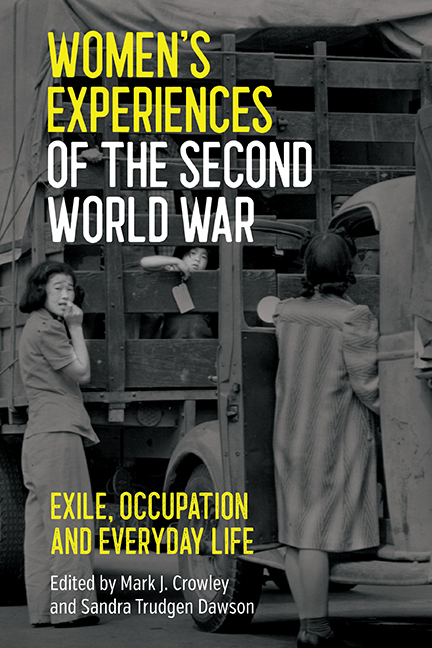Book contents
- Frontmatter
- Dedication
- Contents
- List of Illustrations
- List of Contributors
- Acknowledgements
- List of Abbreviations
- Introduction: Women’s Experiences of the Second World War: Exile, Occupation and Everyday Life
- Part One Living in Exile and under Wartime Occupation
- Part Two Living with Wartime Occupiers
- Part Three Everyday Life at Home and on the Battle Front
- Index
4 - The War Diaries of Hélène Berr and Etty Hillesum: Jewish Women in Occupied Paris and Amsterdam, 1941–1944
Published online by Cambridge University Press: 03 June 2021
- Frontmatter
- Dedication
- Contents
- List of Illustrations
- List of Contributors
- Acknowledgements
- List of Abbreviations
- Introduction: Women’s Experiences of the Second World War: Exile, Occupation and Everyday Life
- Part One Living in Exile and under Wartime Occupation
- Part Two Living with Wartime Occupiers
- Part Three Everyday Life at Home and on the Battle Front
- Index
Summary
A recent bibliography of published and unpublished diaries written by women during the Nazi Occupation of France, compiled by Philippe Lejeune, suggests that our collective understanding of what life was really like for these women is extremely limited. Furthermore, it has been unfairly informed by a preponderance of published diaries written by men. The number of Jewish women's diaries is even smaller. The diaries of Anne Frank and, more recently, the young Polish teenager, Renia Spiegel, have received immense attention and yet, while these diaries are rich sources for the thoughts and emotions of young teenage girls, they offer little insight into the experiences of young women. This chapter illustrates the way the published diaries of two Jewish women in their early and late twenties, living in occupied cities during the Second World War, can help expand our understanding of women's wartime lives, emotions and experiences. Etty Hillesum wrote her diary in Amsterdam, 1941–1942, while Hélène Berr kept a journal of her time in occupied Paris, 1942–1944. Berr was arrested on 15 February 1944, the date of her last journal entry. Both diaries have been edited for publication and Hillesum's diary, A Shattered Life, also includes letters she wrote from Westerbork, a Dutch transit camp from where Jews were then sent to Auchwitz. Both women were deported to concentration camps, and died before the end of the war, Hillesum in 1943 and Berr in 1944. Both diaries were interrupted by deportation.
The two diaries complicate popular understandings of what was at stake for women in wartime and raise questions about how to engage critically with texts that embody the fluid and protean nature of autobiography. On the face of it, a comparison between the texts offers purely historical insight into how two young women in comparable circumstances – both living in cities occupied by the Nazis – coped with anti-Jewish laws while maturing into adulthood. But the diaries also gesture toward a mode of writing that is creative as well as descriptive. By using writing to regain control over their lives and the traumatic events they witness, both authors strive to make sense of their circumstances.
- Type
- Chapter
- Information
- Women's Experiences of the Second World WarExile, Occupation and Everyday Life, pp. 63 - 76Publisher: Boydell & BrewerPrint publication year: 2021



